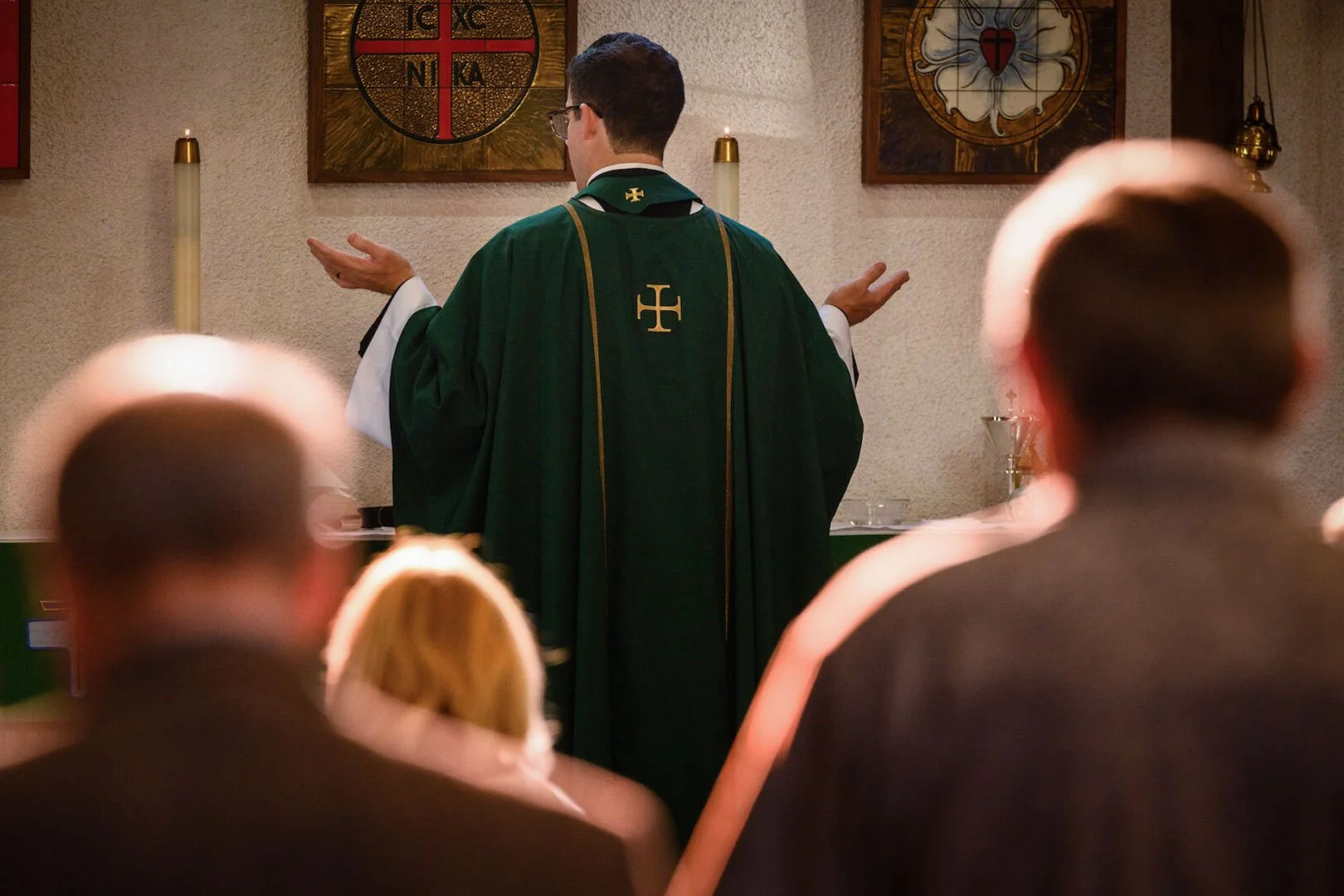Do Our Prayers Change Anything?
Photo: LCMS Communications/Erik M. Lunsford
From The Lutheran Witness, by Jason D. Lane
God is omniscient; He knows all things before they happen and He knows everything we need before we ask. God is omnipotent; He has control over all things and nothing happens that He does not move forward by the power of His might. Even Satan, whom Christ calls “the ruler of this world” (John 14:30), is still God’s devil (see Job 1). What can little Christians like us do before the Almighty? What can we ask of Him that He was not already planning to give?
Even our catechism teaches us that God’s name is holy by itself without our prayer. God’s kingdom comes even without our prayers. His will, too, is done without our prayers. Scripture even says that God is not like us, who regret what we do and constantly change our minds. “I am not like a man,” He says, “that I should have regret” (see 1 Sam. 15:29). All this may lead us to believe that whatever God wills He does, and we cannot change it. Everything, it seems, is already determined for good or for ill. God is immutable, unchanging. So why pray, if prayer can’t change anything?
First, it can. The nineteenth-century Danish philosopher, Soren Kierkegaard, thought that prayer could effect change. But he didn’t think it could change God. He wrote a now wildly popular sentiment: “The prayer does not change God, but it changes the one who offers it.”[1] That is a nice thought, and surely our prayers to God can change our hearts and our desires. But they can do much more than that.
Scripture clearly teaches that God commands us to pray and promises to hear us for the sake of Jesus Christ not merely to change us, but to cause God to act. God changes His mind and heart in a way that does not undermine His eternal and immutable nature. God responds to human sinning in time. He answers prayers in time. In the wicked days of Noah, God “regretted that He had made man on the earth, and it grieved Him to His heart” (Gen. 6:6). In 1 Samuel 15, mentioned above, God regretted making Saul king over Israel. Numerous accounts in Scripture demonstrate that God also answers the prayers of His people. God planned to do one thing, and then, because of the prayers of mortal creatures, He did something else according to those prayers.
Think of Abraham interceding for Lot and his family in Sodom (Gen. 18:22–33). Think of Nineveh, lying in sackcloth and ashes and saying, “Who knows? God may turn and relent and turn from His fierce anger, so that we may not perish” (Jonah 3:9). Think also of Jonah’s outrageous response: “That is why I made hast to flee to Tarshish; for I knew that you are a gracious God and merciful, slow to anger and abounding in steadfast love, and relenting from disaster” (Jonah 3:2). In other words, Jonah knew that God changes His mind, because He is slow to anger and abounding in steadfast love. Sometimes, God does something that He may not have done if no human being had asked Him. Elisha, for example, asked God to open his servant’s eyes to see the angelic hosts surrounding the city of Dothan, and he asked God to blind the Syrians. God did it. He opened the eyes of Elisha’s servant and blinded the eyes of the enemy, “in accordance with the prayer of Elisha” (2 Kings 6:15–18).
Christians need to maintain God’s immutability, because Scripture teaches that God is not fickle about His will toward us: “Every good and perfect gift comes down from above, from the Father of lights, in whom there is no variation or change” (James 1:17). Though we are fickle and feckless, God is constant and clear in His purpose. In preaching on the contrast between God and us from this passage in James, Martin Luther says:
False doctrine doesn’t stand still; it doesn’t stay in one place. Today one way of thinking is right, tomorrow it’s something else. That’s why, since the time of the apostles, new doctrines keep appearing and attack the foundation of our doctrine. They strike quickly. Our Lord God is not like that at all: whatever He does, He stands by it. If I were God, I’d get so tired of this world and want to change it, so that the sun wouldn’t always run the same course. But God’s work never changes. He stands by marriage, even though He’s seen so many broken marriages. No one is able to be that consistent—neither man nor devil (WA 45, 79. From a Sermon preached on James 1:16–21 on 29 April 1537).
God’s constancy and immutability is a teaching of great comfort to inconsistent and uncertain creatures like us, who must live in a changing world and with our own changing hearts.
On the other hand, we must not think of God as a magic lamp that can be manipulated or tricked into giving us what we want. Instead, “God tenderly invites us to believe that He is our true Father and that we are His true children, so that with all boldness and confidence we would ask as dear children ask their dear Father” (SC, Introduction). We should believe it because He says so. We are His children, and He made it so in Holy Baptism.
Therefore, Christ says, “ask, and it will be given to you; seek, and you will find; knock, and it will be opened to you. For everyone who asks receives, and the one who seeks finds, and to the one who knocks it will be opened” (Luke 11:9-10). Whatever prevents us from prayer to our Heavenly Father is of the devil, who wants us to expect less from God, take Him for a harsh master, or, if we must pray at all, treat Him as if He were nothing more than a lucky charm.
Prayer is an act of obedience to God’s command, but it is also an act of faith, to believe that God will hear us for the sake of Christ. Prayer is simply the language of faith that the children of God speak to their Heavenly Father. St. Paul therefore writes, “rejoice always, pray without ceasing, give thanks in all circumstances; for this is the will of God in Christ Jesus for you” (1 Thess. 5:16–18), not because we are always moving our lips in formal prayer, but because faith looks to God in all things. If God has not withheld His only Son from us, “how will He not also with Him graciously give us all things” (Rom. 8:32)?
All that is to say that we are invited to believe and therefore to pray to our Father to give us all things for Jesus’ sake, “let it be deep as Sheol or high as heaven” (Isaiah 7:11). We are taught to pray for His name to hallowed among us, His kingdom to come among us, and His will to be done among us. But we are also taught to pray for the temporal blessings of daily bread. So pray for the eternal things. Pray for the temporal things. Ask, seek, knock. He wants to give it all to us by grace.
[1] Soren Kierkegaard, Purity of Heart Is To Will One Thing (New York: Harper, 1956), 51.
VISIT THE LUTHERAN WITNESS FOR MORE ARTICLES

